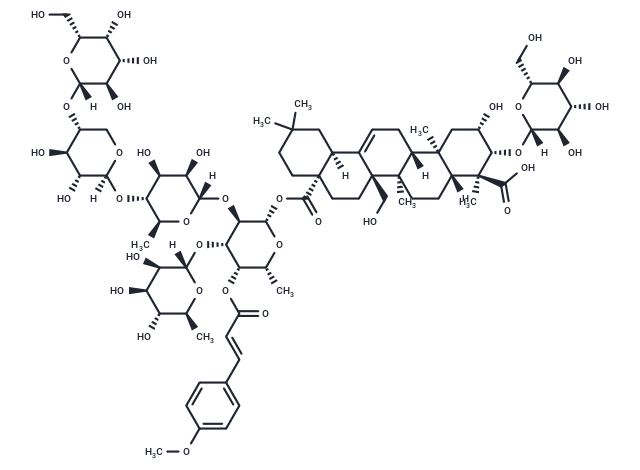Shopping Cart
- Remove All
 Your shopping cart is currently empty
Your shopping cart is currently empty

Onjisaponin B induces autophagy via the AMPK-mTOR signaling pathway, increases the NGF level and accelerates both the removal of mutant huntingtin and A53T α±-synuclein, it may have potential therapeutic effects on Parkinson disease, Alzheimer disease and Huntington disease.

| Pack Size | Price | Availability | Quantity |
|---|---|---|---|
| 5 mg | $93 | In Stock | |
| 10 mg | $166 | In Stock | |
| 25 mg | $281 | In Stock | |
| 50 mg | $413 | In Stock | |
| 100 mg | Preferential | In Stock | |
| 1 mL x 10 mM (in DMSO) | $250 | In Stock |
| Description | Onjisaponin B induces autophagy via the AMPK-mTOR signaling pathway, increases the NGF level and accelerates both the removal of mutant huntingtin and A53T α±-synuclein, it may have potential therapeutic effects on Parkinson disease, Alzheimer disease and Huntington disease. |
| In vitro | In the current study, we aimed to identify autophagy inducers from Chinese medicinal herbs as a potential neuroprotective agent that enhances the clearance of mutant huntingtin and α±-synuclein in PC-12 cells. Through intensive screening using the green fluorescent protein-light chain 3 (GFP-LC3) autophagy detection platform, we found that the ethanol extracts of Radix Polygalae (Yuan Zhi) were capable of inducing autophagy. Further investigation showed that among three single components derived from Radix Polygalae--i.e., polygalacic acid, senegenin and Onjisaponin B--Onjisaponin B was able to induce autophagy and accelerate both the removal of mutant huntingtin and A53T α±-synuclein, which are highly associated with Huntington disease and Parkinson disease, respectively. Our study further demonstrated that Onjisaponin B induces autophagy via the AMPK-mTOR signaling pathway[1] |
| Molecular Weight | 1573.67 |
| Formula | C75H112O35 |
| Cas No. | 35906-36-6 |
| Smiles | [H][C@@]1(O[C@H]2[C@H](C)O[C@@]([H])(O[C@H]3[C@H](OC(=O)[C@]45CCC(C)(C)C[C@@]4([H])C4=CC[C@]6([H])[C@@]7(C)C[C@H](O)[C@H](O[C@]8([H])O[C@H](CO)[C@@H](O)[C@H](O)[C@H]8O)[C@@](C)(C(O)=O)[C@]7([H])CC[C@@]6(C)[C@]4(CO)CC5)O[C@H](C)[C@H](OC(=O)\C=C\c4ccc(OC)cc4)[C@@H]3O[C@]3([H])O[C@@H](C)[C@H](O)[C@@H](O)[C@H]3O)[C@H](O)[C@@H]2O)OC[C@@H](O[C@]2([H])O[C@H](CO)[C@H](O)[C@H](O)[C@H]2O)[C@H](O)[C@H]1O |
| Relative Density. | 1.54 g/cm3 at 20℃ |
| Storage | store at low temperature | Powder: -20°C for 3 years | In solvent: -80°C for 1 year | Shipping with blue ice. | |||||||||||||||||||||||||
| Solubility Information | DMSO: 50 mg/mL (31.77 mM), Sonication is recommended. | |||||||||||||||||||||||||
Solution Preparation Table | ||||||||||||||||||||||||||
DMSO
| ||||||||||||||||||||||||||

Copyright © 2015-2025 TargetMol Chemicals Inc. All Rights Reserved.